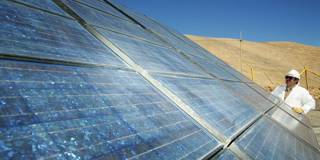The COVID-19 pandemic has hit Latin America especially hard, making it even more difficult for the region to pursue rapid decarbonization and climate resilience. But if policymakers can marry climate policies with a broader social agenda, they can start to turn potential costs into long-term benefits.
WASHINGTON, DC – “We are entering times of rebellion and change. There are those who believe that destiny rests on the knees of the gods; but the truth is that it confronts the conscience of man with a burning challenge.” The Uruguayan novelist Eduardo Galeano’s words are as relevant to Latin America today as they were when he wrote them 50 years ago.
The region’s prospects for managing climate change now must be considered within the context of the COVID-19 crisis. The pandemic has hit Latin American countries where it hurts the most, underscoring their historic underinvestment in the kind of social programs needed to lift the poor and protect the middle classes.
Even before the massive costs inflicted by the pandemic, the region had one of the world’s highest rates of informal employment. Most of its health-care systems were underfunded – as in Peru, which had only around 100 intensive-care beds at the beginning of the pandemic (one per 30,000 people). And around 21% of Latin America’s population was living in slums with limited or no running water, sewage removal, green areas, or reliable electricity.

WASHINGTON, DC – “We are entering times of rebellion and change. There are those who believe that destiny rests on the knees of the gods; but the truth is that it confronts the conscience of man with a burning challenge.” The Uruguayan novelist Eduardo Galeano’s words are as relevant to Latin America today as they were when he wrote them 50 years ago.
The region’s prospects for managing climate change now must be considered within the context of the COVID-19 crisis. The pandemic has hit Latin American countries where it hurts the most, underscoring their historic underinvestment in the kind of social programs needed to lift the poor and protect the middle classes.
Even before the massive costs inflicted by the pandemic, the region had one of the world’s highest rates of informal employment. Most of its health-care systems were underfunded – as in Peru, which had only around 100 intensive-care beds at the beginning of the pandemic (one per 30,000 people). And around 21% of Latin America’s population was living in slums with limited or no running water, sewage removal, green areas, or reliable electricity.